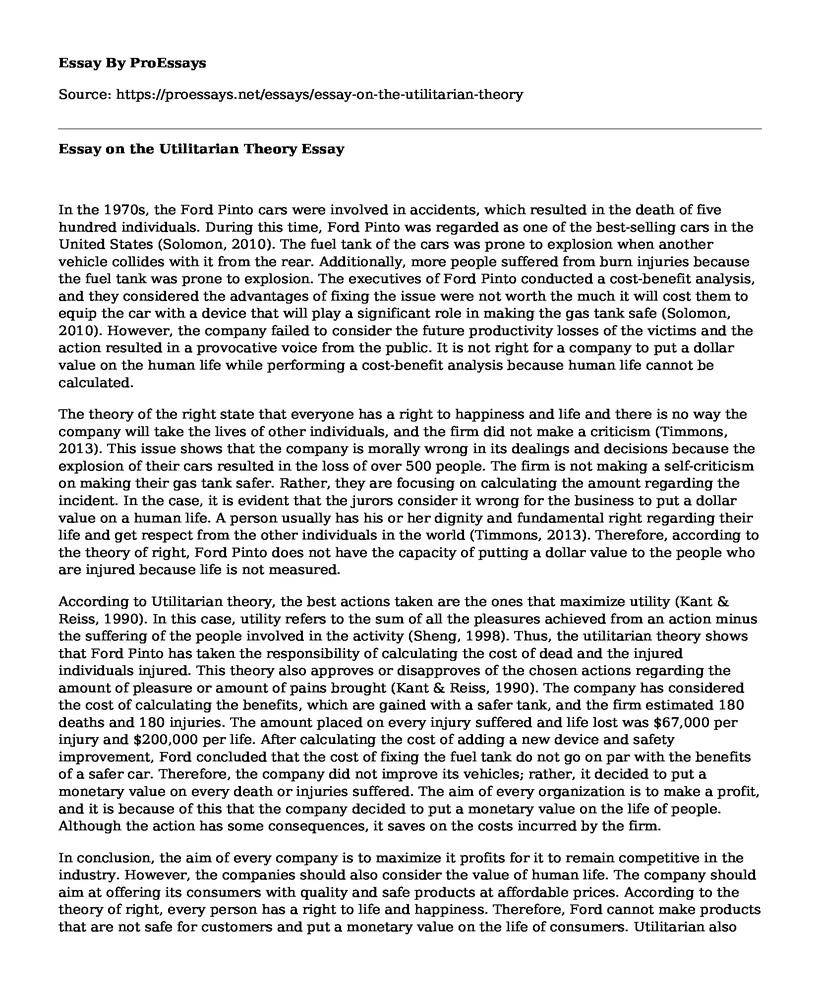In the 1970s, the Ford Pinto cars were involved in accidents, which resulted in the death of five hundred individuals. During this time, Ford Pinto was regarded as one of the best-selling cars in the United States (Solomon, 2010). The fuel tank of the cars was prone to explosion when another vehicle collides with it from the rear. Additionally, more people suffered from burn injuries because the fuel tank was prone to explosion. The executives of Ford Pinto conducted a cost-benefit analysis, and they considered the advantages of fixing the issue were not worth the much it will cost them to equip the car with a device that will play a significant role in making the gas tank safe (Solomon, 2010). However, the company failed to consider the future productivity losses of the victims and the action resulted in a provocative voice from the public. It is not right for a company to put a dollar value on the human life while performing a cost-benefit analysis because human life cannot be calculated.
The theory of the right state that everyone has a right to happiness and life and there is no way the company will take the lives of other individuals, and the firm did not make a criticism (Timmons, 2013). This issue shows that the company is morally wrong in its dealings and decisions because the explosion of their cars resulted in the loss of over 500 people. The firm is not making a self-criticism on making their gas tank safer. Rather, they are focusing on calculating the amount regarding the incident. In the case, it is evident that the jurors consider it wrong for the business to put a dollar value on a human life. A person usually has his or her dignity and fundamental right regarding their life and get respect from the other individuals in the world (Timmons, 2013). Therefore, according to the theory of right, Ford Pinto does not have the capacity of putting a dollar value to the people who are injured because life is not measured.
According to Utilitarian theory, the best actions taken are the ones that maximize utility (Kant & Reiss, 1990). In this case, utility refers to the sum of all the pleasures achieved from an action minus the suffering of the people involved in the activity (Sheng, 1998). Thus, the utilitarian theory shows that Ford Pinto has taken the responsibility of calculating the cost of dead and the injured individuals injured. This theory also approves or disapproves of the chosen actions regarding the amount of pleasure or amount of pains brought (Kant & Reiss, 1990). The company has considered the cost of calculating the benefits, which are gained with a safer tank, and the firm estimated 180 deaths and 180 injuries. The amount placed on every injury suffered and life lost was $67,000 per injury and $200,000 per life. After calculating the cost of adding a new device and safety improvement, Ford concluded that the cost of fixing the fuel tank do not go on par with the benefits of a safer car. Therefore, the company did not improve its vehicles; rather, it decided to put a monetary value on every death or injuries suffered. The aim of every organization is to make a profit, and it is because of this that the company decided to put a monetary value on the life of people. Although the action has some consequences, it saves on the costs incurred by the firm.
In conclusion, the aim of every company is to maximize it profits for it to remain competitive in the industry. However, the companies should also consider the value of human life. The company should aim at offering its consumers with quality and safe products at affordable prices. According to the theory of right, every person has a right to life and happiness. Therefore, Ford cannot make products that are not safe for customers and put a monetary value on the life of consumers. Utilitarian also shows that best actions are the ones maximizing utility. Ford took the step of putting a dollar value on human life for it not to incur more costs.
References
Kant, I., & Reiss, H. S. (1990). Kant's political writings. Cambridge: Cambridge University Press.
Sheng, Q. (1998). A utilitarian general theory of value. Amsterdam: Rodopi.
Solomon, E. L. (2010). Lies and deceits. Bloomington, Indiana: iUniverse, Inc.
Timmons, M. (2013). Moral theory: An introduction. Lanham, Md. : Rowman & Littlefield Publishers.
Cite this page
Essay on the Utilitarian Theory. (2021, Apr 20). Retrieved from https://proessays.net/essays/essay-on-the-utilitarian-theory
If you are the original author of this essay and no longer wish to have it published on the ProEssays website, please click below to request its removal:
- Aerospace Engineering Essay Example
- Essay Example on Employment Laws: Key Rules and Conflict Resolution
- Ethical Leadership: Living by the Three V-3 Leadership Qualities - Essay Sample
- Paper Example on Waging a Living: Does Work Provide Enough for Working Americans?
- Essay Example on Optimizing Daycare Staffing for Seasonal Variations
- Paper Example on Letter Writing Needs Improvement: How Malaria Causes Unemployment
- Workplace Discrimination - Free Report Sample







